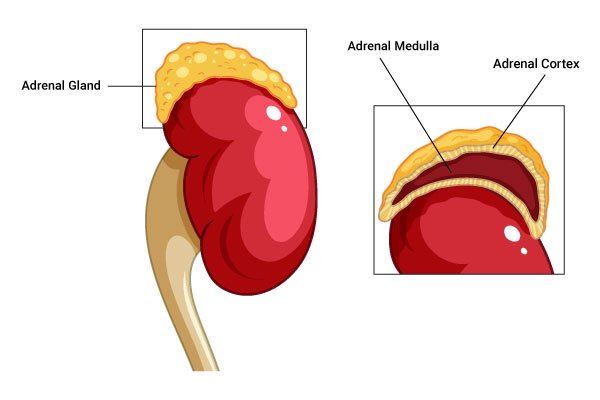There are many instances when the cells of adrenal gland which are present on the kidneys divide and grow abnormally. On these occasions, generally, a procedure known as adrenalectomy is done. In this procedure, which is surgical in nature, removal of these glands is performed on the patient. In some cases, this operation is also done when the hormone related to this gland is abnormally produced or secreted. Although the nature of adrenalectomy is usually laparoscopic, some patients also require an open type of this surgery.
What is an adrenal gland?

When we talk about adrenal gland, the main organ we must know about is adrenal cortex. This organ is a part of this gland which sits at the top of the kidney. As we have two kidneys, one on each side of the body, the glands are also two in number. The main part of this gland is the cortex which makes the triangular shape of it. The main hormones that this gland secretes are steroidal in nature, all derived from cholesterol. The importance of these hormones is their ability to aid the transcription process. Three main types of hormones secreted by adrenal gland are aldosterone, cortisol and androgens. The functionality of these hormones includes reabsorption at the nephron level, increasing glucose and the production of testosterone. Some of the common diseases related to adrenal gland are:
- Addison disease
- Cushing’s syndrome
Cushing’s syndrome is when the adrenal gland produces hormones abnormally and adrenalectomy surgery is generally needed. In this disease following complications are caused:
- Increased ACTH
- Increased steroids
- Lowered potassium,
- Lowered proton levels
- Increased blood pressure
- Hyperglycemia
- Prostate cancer
How is laparoscopic adrenalectomy performed?
The patient is first put under the effect of general anesthesia before starting the incision making on the abdomen. Only a minimum length cut is made through which the tools are inserted to perform this procedure. More than one incision may be needed in the lower abdomen to perform adrenalectomy. An endoscope is inserted through one of these holes by an experienced practitioner to operate upon the affected gland. In most cases this gland is completely removed from the place of its origin into a medical bag. The whole procedure of this adrenalectomy surgery takes up to two hours to complete.
Why should you consider laparoscopic adrenalectomy?
One of the primary advantages of laparoscopic adrenalectomy is that its nuanced operative procedure is very less invasive in comparison to the open surgery method. This is quite natural that the healing efficiency and time after this surgery is less than an open surgery. Also the intensity of pain felt after adrenalectomy surgery is lower too. Apart from these things what makes the laparoscopic form of this surgery more favorable is the remarkable resemblance of its result with the general surgery procedure accompanied with the perks of minimum cosmetic disruption and minimum hospital stay. The usual stay at the hospital after this surgery is one night.
Some other adrenalectomy surgery procedures
- The adrenalectomy is sometimes done from the behind side of the body and not via abdominal incisions. This is more of a straightforward method to remove the adrenal gland as this organ is more close to the back. Named after the position through which this surgery is done, it is called Posterior retroperitoneoscopic adrenalectomy.
- A newer version of this procedure nowadays is done robotically for which the surgeons must be equipped with relevant skills to operate through technological machinery.
When is there a need for laparoscopic adrenalectomy?
- As already highlighted that increased hormone production and secretion caused by the condition known as Cushing’s syndrome can cause several complications, some of these complications can even also lead to health hazardous conditions. It is advised by the doctors in these circumstances to go through an adrenalectomy surgery.
- Certain kidney cancer conditions can also lead to the point where adrenalectomy is needed. These conditions are:
- Some adrenal gland cancer can disrupt the hormone regulation of this organ which can only be rectified by removing a part or the whole gland.
- Cancer in the cortex of adrenal gland is not a usual type of condition. However, this condition, if only suspected, leads to the removal of glands. This is because this type of tumor spreads with a high rate and even a biopsy is not advised.
- Some cancer in this gland can metastasize to spread in the surrounding organs. In some cases cancer from other organs such as lungs, breasts, etc can reach and affect the adrenal gland severely. In this case of cancer doctors must evaluate the intensity of the original cancer through which it is spread before performing an adrenalectomy.
Conclusion
There are many things you must know before going through any variation of adrenalectomy. As the adrenal gland is one of the most important organs of your body which regulates the production of the most important protein, one must have a comprehensive conversation with their doctor before getting an adrenalectomy surgery. Even though Laparoscopic adrenalectomy offers several benefits over the open surgery method, you must get a green signal from your urologist to confirm if it is suitable for you. One of the primary challenges you may face during the process of getting involved in adrenalectomy is finding an honest and skilled urologist. Well, you don’t need to worry about it. Contact us immediately to book an appointment with an experienced urologist Dr. Saket Narnoli in Dhanbad.






